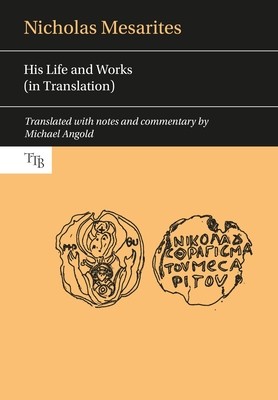
- We will send in 10–14 business days.
- Publisher: Liverpool University Press
- Pages: 362
- ISBN-10: 178694006X
- ISBN-13: 9781786940063
- Format: 15 x 21.1 x 2.5 cm, hardcover
- Language: English
- SAVE -10% with code: EXTRA
Nicholas Mesarites (e-book) (used book) | bookbook.eu
Reviews
Description
The aim of this book is to make accessible to a wider audience the works of Nicholas Mesarites, who deserves to be better known than he is. He was an ecclesiastic, who from the turn of the twelfth century provides a vivid record from personal experience of his troubled times, which saw the descent of the Byzantine Empire into factionalism, the loss of its capital Constantinople in 1204 to the armies of the fourth crusade, and its eventual reconstitution in exile as the Empire of Nicaea.
Nicholas Mesarites is difficult to place, because the record he left behind was not that of a historian, more that of a social commentator. He preferred to highlight individual incidents and to emphasise personal experience and family relationships. He does not try to make sense of events; only to record their immediate impact. His is a fragmented autobiographical approach, which brings the reader closer to events, but leaves him to construct the bigger picture for himself; whether it is an eyewitness account of a palace coup that failed; a description of the relics of the passion; the memories of a brother, who became a defender of Orthodoxy; the detailed evocation of the Church of the Holy Apostles at Constantinople; the portrayal of his own nervous collapse following the loss of Constantinople; a character study of an ecclesiastical rival; or not least the mishaps -often for comical effect - suffered in the course of his travels. Because he was writing, as he tells us, largely toplease himself, Nicholas Mesarites provides an idiosyncratic view of the society in which he moved, and, as he was less bound by literary convention than his contemporaries, he writes with a refreshing directness.
EXTRA 10 % discount with code: EXTRA
The promotion ends in 19d.00:47:22
The discount code is valid when purchasing from 10 €. Discounts do not stack.
- Publisher: Liverpool University Press
- Pages: 362
- ISBN-10: 178694006X
- ISBN-13: 9781786940063
- Format: 15 x 21.1 x 2.5 cm, hardcover
- Language: English English
The aim of this book is to make accessible to a wider audience the works of Nicholas Mesarites, who deserves to be better known than he is. He was an ecclesiastic, who from the turn of the twelfth century provides a vivid record from personal experience of his troubled times, which saw the descent of the Byzantine Empire into factionalism, the loss of its capital Constantinople in 1204 to the armies of the fourth crusade, and its eventual reconstitution in exile as the Empire of Nicaea.
Nicholas Mesarites is difficult to place, because the record he left behind was not that of a historian, more that of a social commentator. He preferred to highlight individual incidents and to emphasise personal experience and family relationships. He does not try to make sense of events; only to record their immediate impact. His is a fragmented autobiographical approach, which brings the reader closer to events, but leaves him to construct the bigger picture for himself; whether it is an eyewitness account of a palace coup that failed; a description of the relics of the passion; the memories of a brother, who became a defender of Orthodoxy; the detailed evocation of the Church of the Holy Apostles at Constantinople; the portrayal of his own nervous collapse following the loss of Constantinople; a character study of an ecclesiastical rival; or not least the mishaps -often for comical effect - suffered in the course of his travels. Because he was writing, as he tells us, largely toplease himself, Nicholas Mesarites provides an idiosyncratic view of the society in which he moved, and, as he was less bound by literary convention than his contemporaries, he writes with a refreshing directness.


Reviews